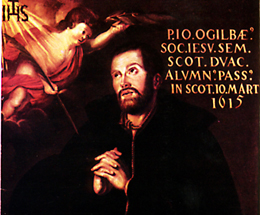Saint JOHN OGILVIE, (1579 - 1615)
Priest, Martyr
October 14 (Jesuit liturgy)
March 10 (Roman Liturgy)
Priest, Martyr
October 14 (Jesuit liturgy)
March 10 (Roman Liturgy)

John entered the Austrian Province on November 5, 1599, and was sent to the novitiate in Moravia. After the usual studies he was ordained priest at Paris in 1610 and finally, after insistent pleading with his superiors and fully aware of the dangers involved, ha was able to return to his native country in 1613, disguised sometimes as a horse trader and sometimes as demobilized solder. His unfailing humor and creativeness stood him in good stead.
His ministry to Catholics in Edinburgh and other areas got off to a slow start. Even zealous Catholics were reluctant to harbor him, but at last, in the spring of 1614 three families received him and he was able to say Mass and preach and even made several visits to Edinburgh prisons to strengthen Catholics confined there. His work, however, was suddenly cut short when he was betrayed by a prospective convert to Catholicism and arrested in Glasgow on October 14, 1614.
During five months in prison, where he underwent detailed questioning and severe tortures (beatings, needles under his fingernails, deprivation of sleep for 9 days), he refused to divulge the names of Catholics who had sheltered him or attended his services. He wrote a record of his imprisonment and interrogations, which he managed to smuggle out of the prison.
Finally he was hanged as a traitor on March 10, 1615, the principal cause of his martyrdom being his continued insistence on the supremacy of Pope over King in spiritual matters. "In all that concerns the king," he said, "I will be lavishly obedient. In any attack on his temporal power, I will shed my last drop of blood for him. But in the things of spiritual jurisdiction which a king unjustly seizes I cannot and must not obey."
He was beautified by Pope Pius XI on December 22, 1929, and canonized by Pope Paul VI on October 17, 1976.
"May his intercession help us so that our Society, faithfully following the Ignatian charism, may be in the Church today, too, a true source of apostolic sanctity, while serving 'the Lord alone and the Church, his spouse, under the Roman pontiff, the vicar of Christ on earth.'" (P. Arrupe, AR XVI [1976], 907.
***************************************



 1:14 PM
1:14 PM
 dinhjb
dinhjb


Post a Comment